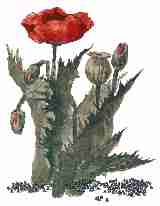The study of genes and their influence on alcohol consumption can operate on many different levels. Some studies examine how genes may interact with the environment, some look specifically at family history of alcohol dependence, and some zero in on "pieces" of genes and their influence on drinking. A new study has found that individuals carrying a G allele of the A118G polymorphism of the mu-opioid receptor gene (OPRM1) crave alcohol more than individuals with the more common A allele. G Allele Of Mu-opioid Receptor Gene
Is Linked To Craving For AlcoholResults are published in the January issue of Alcoholism: Clinical & Experimental Research.
"The more sensitive mu-opioid receptor in individuals carrying a G allele of the A118G polymorphism may lead to different behavioral responses due to a different physiological functioning of the receptor," explained Esther van den Wildenberg, a researcher at the University of Maastricht and corresponding author for the study. "Beta-endorphins are released upon alcohol or drug intake. Different receptor functioning could affect functions such as drug-induced euphoria and analgesia which might influence the subjective experience of the drug and subsequent use."
Van den Wildenberg added that people may not realize that exposure to alcoholic cues is very common in society, for example, in supermarkets, on television, in bars, on billboards, in magazines, etc.
"We were interested whether heavy drinking individuals -- in other words, not yet alcohol dependent -- carrying a copy of the G allele would respond differently than 'standard' genotype individuals when exposed to alcohol cues," she said.
"If the G allele affects subjective experience such as craving for alcohol after exposure, this could also have an influence on subsequent drinking behavior. It turns out that G allele carriers do crave significantly more for alcohol after alcohol exposure, compared with the A allele individuals."
"Studies like this one are important in terms of saying something about how a gene might be involved in alcohol dependence," said Kent Hutchison, associate professor at the University of Boulder, Colorado. "In this case, the study suggests that this genetic marker may be related to how much a person craves alcohol in a high-risk situation, that is, when someone hands him or her an alcoholic drink. At this point in time, this gene definitely seems to be one of the key genes related to alcohol dependence. There will undoubtedly be others."
Researchers recruited 108 male, heavy drinkers via flyers in and around the University of Maastricht. Participants were either homozygous for the A allele (n=84) or carrying at least one copy of the G allele (n=24). All participated in a cue-reactivity test where they were exposed to water and beer in three-minute trials. Dependent variables included subjective craving for alcohol, subjective arousal, and saliva production.
"By looking at cue-elicited craving in heavy drinkers, we look more specifically into a so-called 'endophenotype,'" explained van den Wildenberg. An endophenotype, she said, is like an intermediate phenotype. It lies "between" the genotype, referring to genes, and the phenotype, which refers to the disorder; reflecting a biological mechanism that underlies the disorder.
"Not only did G allele carriers report even significantly more craving for alcohol than the A allele individuals," said van den Wildenberg, "but G allele carriers reported more life-time drug use compared with the 'standard' genotype participants. Especially the use of cannabis and amphetamines."
"The primary finding is important because individuals who are more prone to cue-induced craving may also be more prone to relapse in a high-risk situation," said Hutchison. "In other words, alcoholics with the G allele who are trying to remain abstinent may have more difficulty than alcoholics without the G allele." The secondary finding -- of greater other-drug use among individuals in the G-allele group -- is less conclusive, he said.
"The problem is that there are many reasons why people use drugs," he noted. "This genetic marker may influence some of the variables that lead to drug use, but there are many other variables that are not related to this gene. This is part of the reason that there are inconsistencies in the scientific literature."
Nonetheless, both van den Wildenberg and Hutchison noted the importance for treatment options of identifying "risk genes" that predispose certain individuals to alcohol-problems. "Eventually, knowledge about the genetic variables that influence alcohol abuse may be used to help determine which treatment is most appropriate for a given individual," said Hutchison. "For example, an individual who has a gene that confers some vulnerability in a particular system in the brain may benefit most from a treatment that targets this vulnerability."
"In this case," added van den Wildenberg, "patients with a G allele of the mu-opioid receptor gene might benefit from ...the anti-craving medication naltrexone, which blocks the mu-opioid receptor. Naltrexone has been found to work especially well in alcohol-dependent patients with a G allele, possibly due to a stronger decrease in craving in these individuals."
Alcoholism: Clinical & Experimental Research (ACER) is the official journal of the Research Society on Alcoholism and the International Society for Biomedical Research on Alcoholism. Co-authors of the ACER paper, "A Functional Polymorphism of the Mu-Opioid Receptor Gene (OPRM1) Influences Cue-Induced Craving for Alcohol in Male Heavy Drinkers," were: Reinout W. Wiers and Joelle Dessers of the Faculty of Psychology at Maastricht University; Rob G.J.H. Janssen, Ellen H. Lambrichs, and Hubert J.M. Smeets of the Department of Population Genetics & Genome Center Maastricht; and Gerard J.P. van Breukelen of the Department of Methodology and Statistics at Maastricht University, the Netherlands.
The study was funded by Maastricht University and the Dutch National Science Foundation.
HOMEMu
Opium
History
Heroin Inc
Opium Images
Heroin in Song
Kandahar Vice
Opium Timeline
Opioid Receptors
Off-shore Pharmacies
Pain medication online
Heroin after the Taliban
Afghanistan Bans Opium
UK News: Heroin on the NHS
Afghanistan, Opium and the Taliban
The Heroin Trail: Britain, USA and Afghanistan
Savoury morphine crackers from Marks and Spencer
Vicodin: 'some of them actually think they deserve it'
UK police chief says legalise heroin and sell it on the street
